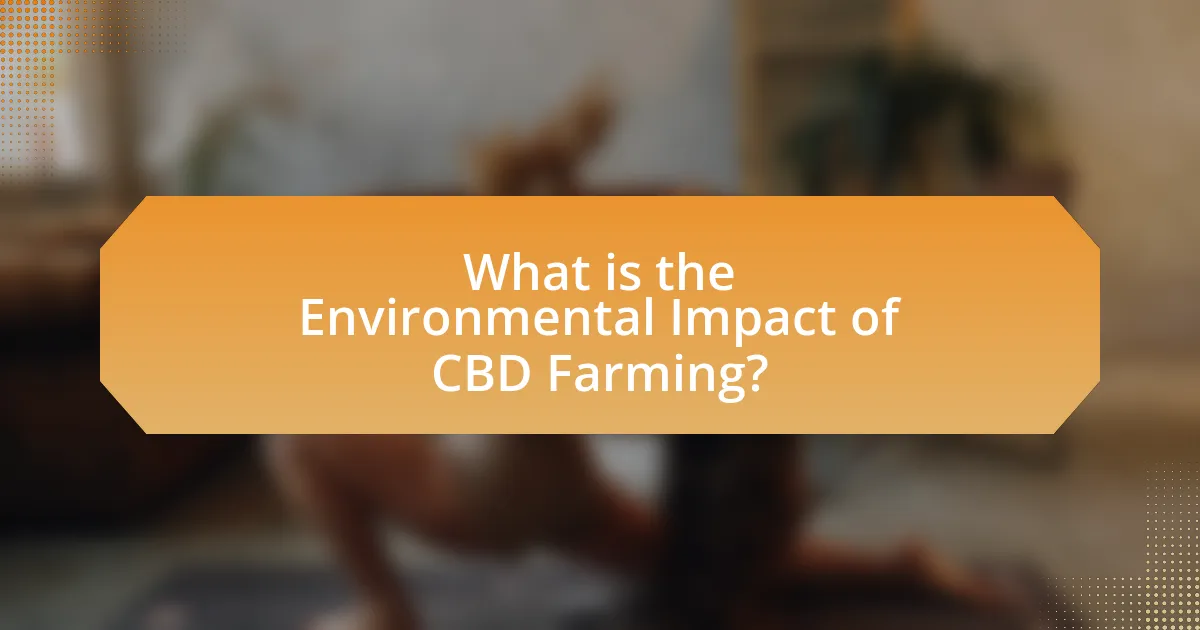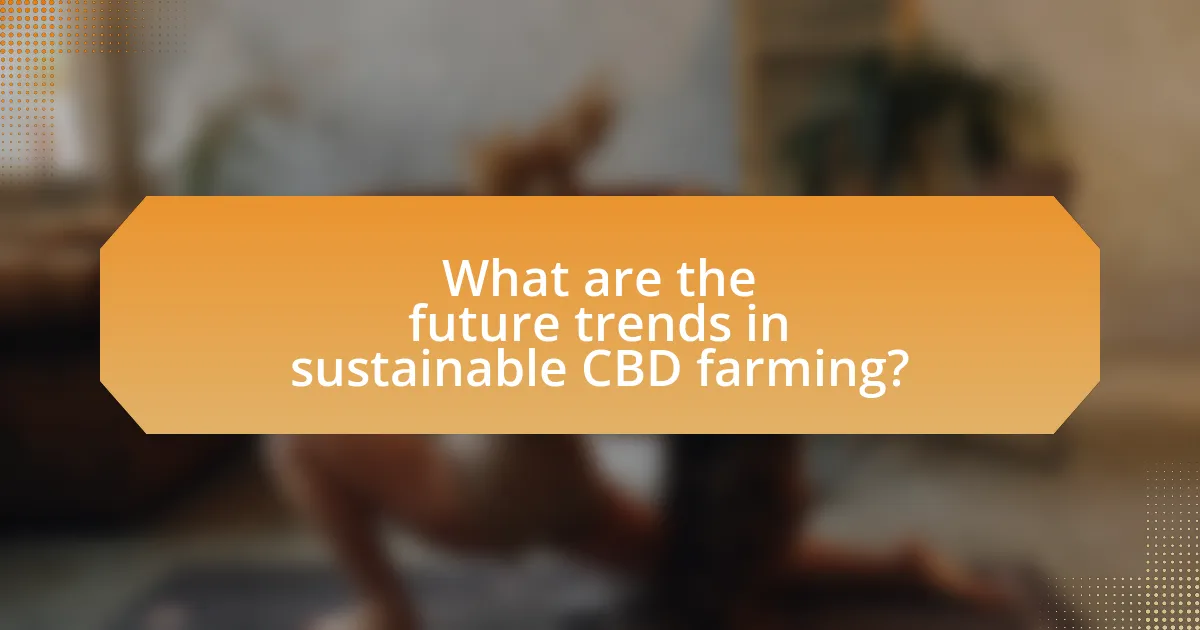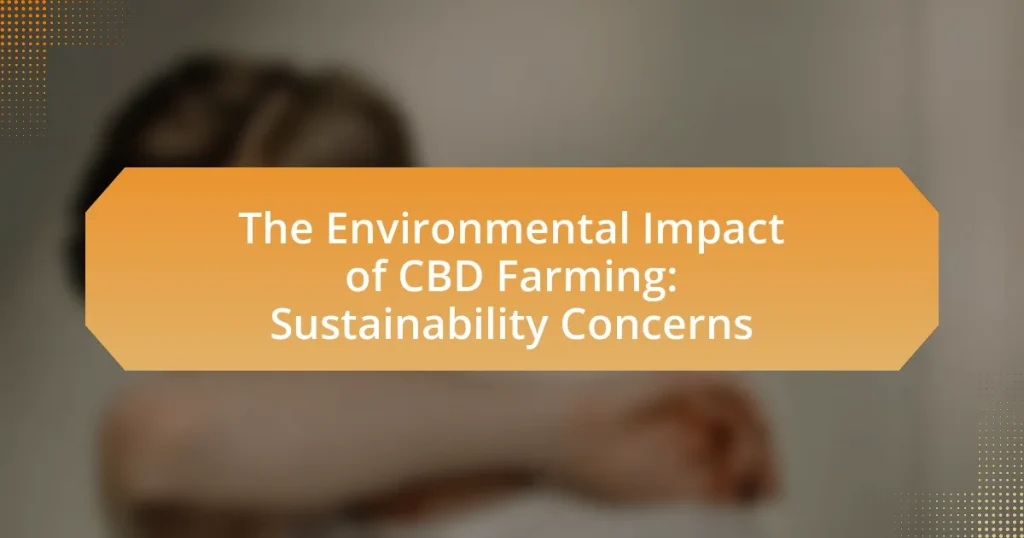The article examines the environmental impact of CBD farming, focusing on sustainability concerns related to soil degradation, water usage, and pesticide application. It highlights how monoculture practices in CBD cultivation can lead to soil erosion and nutrient depletion, while significant water consumption strains local resources, particularly in arid regions. The article also discusses the effects of CBD farming on local ecosystems, biodiversity loss, and the importance of sustainable practices to mitigate these impacts. Additionally, it addresses regulatory frameworks, consumer awareness, and innovative techniques that can enhance sustainability in CBD farming.

What is the Environmental Impact of CBD Farming?
The environmental impact of CBD farming includes soil degradation, water usage, and pesticide application. CBD farming can lead to soil erosion and nutrient depletion due to monoculture practices, where the same crop is grown repeatedly in the same area. Additionally, the cultivation of hemp for CBD often requires significant water resources, which can strain local water supplies, especially in arid regions. Furthermore, the use of pesticides and fertilizers in CBD farming can contribute to chemical runoff, harming local ecosystems and biodiversity. Studies indicate that hemp can be a more sustainable crop compared to traditional agriculture, but its environmental footprint still raises concerns that need to be addressed for sustainable farming practices.
How does CBD farming affect local ecosystems?
CBD farming can significantly affect local ecosystems by altering soil health, water usage, and biodiversity. The cultivation of CBD-rich hemp often requires intensive agricultural practices, which can lead to soil degradation and nutrient depletion. For instance, studies have shown that monoculture farming, common in CBD cultivation, reduces soil microbial diversity, essential for maintaining soil health. Additionally, CBD farming can increase water consumption, potentially straining local water resources, especially in arid regions. Research indicates that hemp requires substantial irrigation, which can deplete nearby water sources and affect aquatic ecosystems. Furthermore, the introduction of CBD farming can disrupt local wildlife habitats, as land is cleared for cultivation, leading to a decline in native species. Overall, while CBD farming presents economic opportunities, its environmental impacts necessitate careful management to mitigate adverse effects on local ecosystems.
What specific environmental changes are associated with CBD farming?
CBD farming is associated with several specific environmental changes, including soil degradation, water usage alterations, and biodiversity impacts. The cultivation of CBD-rich hemp often requires significant land use, which can lead to soil erosion and nutrient depletion if not managed sustainably. Additionally, CBD farming can increase water consumption, particularly in regions where irrigation is necessary, potentially straining local water resources. Furthermore, the introduction of hemp crops can disrupt local ecosystems, affecting native plant and animal species due to changes in habitat and competition for resources. These environmental changes highlight the need for sustainable farming practices to mitigate negative impacts.
How do these changes impact biodiversity in farming areas?
Changes in farming practices, particularly those related to CBD farming, significantly impact biodiversity in farming areas by reducing habitat diversity and altering species interactions. The introduction of monoculture practices, often seen in CBD cultivation, leads to a decline in plant and animal species that rely on diverse ecosystems for survival. Research indicates that monocultures can decrease species richness by up to 50%, as diverse habitats support a wider range of organisms. Additionally, the use of pesticides and fertilizers in CBD farming can harm non-target species, further diminishing biodiversity. Studies show that areas with high pesticide use experience a 30% reduction in pollinator populations, which are crucial for ecosystem health.
What are the primary sustainability concerns related to CBD farming?
The primary sustainability concerns related to CBD farming include water usage, pesticide application, soil health, and biodiversity loss. CBD farming often requires significant water resources, which can lead to depletion of local water supplies, especially in arid regions. Additionally, the use of synthetic pesticides and fertilizers can harm surrounding ecosystems and contaminate soil and water sources. The cultivation of CBD can also lead to soil degradation if sustainable practices are not employed, impacting long-term agricultural viability. Furthermore, large-scale CBD farming can contribute to biodiversity loss by replacing diverse ecosystems with monoculture crops, which diminishes habitat for various species. These concerns highlight the need for sustainable farming practices to mitigate environmental impacts.
How does water usage in CBD farming contribute to sustainability issues?
Water usage in CBD farming significantly contributes to sustainability issues by depleting local water resources and potentially leading to soil degradation. High water consumption in CBD cultivation can strain freshwater supplies, especially in arid regions where water scarcity is already a concern. For instance, studies indicate that cannabis cultivation can require up to 6 gallons of water per plant per day, which exacerbates water shortages and affects surrounding ecosystems. Additionally, excessive irrigation can lead to runoff, carrying fertilizers and pesticides into waterways, thus harming aquatic life and disrupting local biodiversity.
What role does soil health play in the sustainability of CBD farming?
Soil health is crucial for the sustainability of CBD farming as it directly influences plant growth, nutrient availability, and ecosystem balance. Healthy soil promotes robust root systems, enhances water retention, and supports beneficial microorganisms, which collectively lead to higher yields and better quality CBD crops. Research indicates that soil rich in organic matter can increase crop resilience to pests and diseases, reducing the need for chemical inputs. For instance, a study published in the journal “Agriculture, Ecosystems & Environment” found that farms practicing regenerative agriculture, which focuses on improving soil health, reported a 30% increase in CBD yield compared to conventional farming methods. This evidence underscores the importance of maintaining soil health for sustainable CBD farming practices.
Why is it important to address the environmental impact of CBD farming?
Addressing the environmental impact of CBD farming is crucial to ensure sustainable agricultural practices and protect ecosystems. CBD farming can lead to soil degradation, water depletion, and biodiversity loss if not managed responsibly. For instance, a study published in the journal “Environmental Science & Technology” highlights that intensive farming practices can result in significant pesticide runoff, which contaminates local water sources and harms aquatic life. Therefore, recognizing and mitigating these environmental impacts is essential for promoting ecological balance and ensuring the long-term viability of CBD cultivation.
What are the long-term consequences of neglecting sustainability in CBD farming?
Neglecting sustainability in CBD farming leads to significant long-term environmental degradation, including soil depletion, water scarcity, and loss of biodiversity. Unsustainable practices, such as excessive pesticide use and monoculture, can result in diminished soil health, making it less fertile over time. For instance, studies indicate that continuous cultivation without crop rotation can reduce soil organic matter by up to 50% within a few years. Additionally, over-extraction of water resources for irrigation can lead to aquifer depletion, affecting local ecosystems and communities reliant on these water sources. Furthermore, the loss of biodiversity occurs as native plant and animal species are displaced, which can disrupt local ecosystems and reduce resilience to climate change. These consequences underscore the critical need for sustainable practices in CBD farming to ensure long-term ecological balance and resource availability.
How can consumer awareness influence sustainable practices in CBD farming?
Consumer awareness can significantly influence sustainable practices in CBD farming by driving demand for environmentally friendly products. When consumers prioritize sustainability, they encourage farmers to adopt practices such as organic cultivation, reduced pesticide use, and water conservation methods. Research indicates that 66% of global consumers are willing to pay more for sustainable brands, which incentivizes CBD farmers to implement eco-friendly practices to meet this market demand. Additionally, increased consumer scrutiny can lead to greater transparency in supply chains, prompting farmers to adopt certifications and standards that promote sustainability.
How can CBD farming practices be made more sustainable?
CBD farming practices can be made more sustainable by implementing organic farming techniques, utilizing crop rotation, and adopting water conservation methods. Organic farming reduces chemical inputs, which minimizes soil and water pollution, while crop rotation enhances soil health and biodiversity. Additionally, employing water conservation techniques, such as drip irrigation, can significantly reduce water usage, addressing the high water demands associated with traditional farming methods. According to a study published in the Journal of Cleaner Production, organic farming can lead to a 30% reduction in greenhouse gas emissions compared to conventional practices, reinforcing the effectiveness of these sustainable methods.
What innovative techniques are being used to reduce environmental impact?
Innovative techniques being used to reduce environmental impact in CBD farming include regenerative agriculture, precision farming, and the use of biopesticides. Regenerative agriculture focuses on improving soil health and biodiversity, which enhances carbon sequestration and reduces the need for chemical fertilizers. Precision farming employs technology such as GPS and sensors to optimize resource use, minimizing waste and environmental degradation. The adoption of biopesticides, derived from natural materials, reduces reliance on synthetic chemicals, thereby lowering toxicity to ecosystems. These methods collectively contribute to more sustainable farming practices, addressing the environmental concerns associated with CBD cultivation.
How can farmers balance profitability with sustainability in CBD farming?
Farmers can balance profitability with sustainability in CBD farming by implementing regenerative agricultural practices that enhance soil health and reduce input costs. These practices include crop rotation, cover cropping, and organic pest management, which not only improve yields but also lower the reliance on synthetic fertilizers and pesticides. Research indicates that regenerative practices can increase profitability by up to 20% while simultaneously reducing environmental impact, as they promote biodiversity and improve ecosystem resilience. By adopting these methods, farmers can achieve a sustainable model that supports both economic viability and environmental stewardship.

What are the regulatory frameworks surrounding CBD farming and sustainability?
The regulatory frameworks surrounding CBD farming and sustainability primarily include federal, state, and local laws that govern the cultivation, processing, and distribution of hemp-derived products. In the United States, the 2018 Farm Bill legalized hemp cultivation, defining hemp as cannabis with less than 0.3% THC, and established guidelines for its production, including requirements for licensing and compliance with agricultural standards. Additionally, the U.S. Department of Agriculture (USDA) provides regulations on hemp farming practices, which include sustainability measures such as soil health and water usage.
State regulations can vary significantly, with some states implementing stricter guidelines regarding pesticide use, organic certification, and environmental impact assessments. For instance, California has specific regulations aimed at promoting sustainable farming practices, including water conservation and soil management. Furthermore, the Environmental Protection Agency (EPA) oversees the use of pesticides in hemp farming, ensuring that products used are safe for both the environment and human health.
These regulatory frameworks are designed to promote sustainable practices in CBD farming, addressing concerns such as soil degradation, water usage, and chemical runoff, which can impact ecosystems. Compliance with these regulations is essential for farmers to ensure their operations are sustainable and legally compliant.
How do regulations impact the environmental practices of CBD farmers?
Regulations significantly influence the environmental practices of CBD farmers by establishing standards for sustainable farming methods. These regulations often require farmers to implement practices that minimize pesticide use, conserve water, and protect soil health, thereby promoting environmentally friendly cultivation. For instance, the 2018 Farm Bill in the United States set guidelines for hemp cultivation, which include compliance with state agricultural regulations that often emphasize organic farming practices and environmental stewardship. As a result, CBD farmers are incentivized to adopt practices that reduce their ecological footprint, such as crop rotation and integrated pest management, which are essential for maintaining biodiversity and soil integrity.
What specific laws govern water usage and pesticide application in CBD farming?
The specific laws governing water usage and pesticide application in CBD farming include the Clean Water Act and the Federal Insecticide, Fungicide, and Rodenticide Act (FIFRA). The Clean Water Act regulates discharges of pollutants into U.S. waters, requiring permits for agricultural runoff that may affect water quality. FIFRA mandates that all pesticides used in agriculture, including those for CBD farming, must be registered and approved by the Environmental Protection Agency (EPA), ensuring they meet safety and efficacy standards. These laws are designed to protect both water resources and public health, reflecting the regulatory framework that CBD farmers must adhere to in their operations.
How do these regulations vary by region or country?
Regulations regarding CBD farming vary significantly by region and country, reflecting differing legal frameworks and environmental policies. For instance, in the United States, the 2018 Farm Bill legalized hemp cultivation, but states have the authority to impose their own regulations, leading to a patchwork of laws; some states have stringent licensing requirements while others have minimal oversight. In contrast, the European Union has established a more unified regulatory framework, allowing CBD products derived from hemp with less than 0.2% THC, but individual member states can enforce additional restrictions. Countries like Canada have comprehensive regulations under the Cannabis Act, which governs both hemp and marijuana, emphasizing sustainability and environmental impact assessments. These variations illustrate how local agricultural practices, legal interpretations, and environmental priorities shape the regulatory landscape for CBD farming globally.
What role do certifications play in promoting sustainable CBD farming?
Certifications play a crucial role in promoting sustainable CBD farming by establishing standards that ensure environmentally friendly practices. These certifications, such as USDA Organic or Certified Naturally Grown, require farmers to adhere to specific guidelines that minimize chemical use, promote biodiversity, and enhance soil health. For instance, a study published in the Journal of Sustainable Agriculture found that certified organic farms typically have higher soil quality and lower pesticide residues compared to non-certified farms. This evidence supports the assertion that certifications not only guide farmers towards sustainable practices but also provide consumers with assurance regarding the environmental impact of their purchases.
Which certifications are most recognized in the CBD industry?
The most recognized certifications in the CBD industry include USDA Organic, GMP (Good Manufacturing Practices), and ISO (International Organization for Standardization) certifications. USDA Organic certification ensures that CBD products are made from hemp grown without synthetic fertilizers or pesticides, adhering to strict agricultural standards. GMP certification indicates that products are manufactured consistently and controlled according to quality standards, ensuring safety and efficacy. ISO certification provides a framework for quality management systems, enhancing product reliability and customer satisfaction. These certifications are critical for establishing trust and credibility in the rapidly evolving CBD market.
How do these certifications affect consumer choices and market demand?
Certifications significantly influence consumer choices and market demand by providing assurance of sustainability and ethical practices in CBD farming. Consumers increasingly prefer products that are certified organic or environmentally friendly, as these certifications signal adherence to specific standards that align with their values. For instance, a survey by the Organic Trade Association found that 82% of consumers are more likely to purchase products with organic certification, indicating a direct correlation between certification and purchasing behavior. Additionally, market data shows that products with sustainability certifications often command higher prices, reflecting increased demand among environmentally conscious consumers. This trend underscores the importance of certifications in shaping consumer preferences and driving market dynamics in the CBD sector.

What are the future trends in sustainable CBD farming?
Future trends in sustainable CBD farming include the adoption of regenerative agricultural practices, increased use of organic inputs, and the integration of technology for precision farming. Regenerative practices, such as cover cropping and crop rotation, enhance soil health and biodiversity, which are essential for sustainable farming. The organic market for CBD is expanding, with consumers increasingly demanding products free from synthetic pesticides and fertilizers, leading farmers to adopt organic cultivation methods. Additionally, technology such as drones and soil sensors is being utilized to optimize resource use, reduce waste, and improve crop yields, aligning with sustainability goals. These trends are supported by the growing body of research indicating that sustainable practices can lead to higher profitability and environmental benefits in the long term.
How is technology shaping the future of sustainable practices in CBD farming?
Technology is significantly shaping the future of sustainable practices in CBD farming by enabling precision agriculture, which optimizes resource use and minimizes environmental impact. Advanced technologies such as IoT sensors, drones, and data analytics allow farmers to monitor soil health, water usage, and crop conditions in real-time, leading to more efficient farming practices. For instance, a study published in the journal “Agricultural Systems” highlights that precision irrigation systems can reduce water consumption by up to 50%, directly benefiting sustainability efforts in CBD cultivation. Additionally, the use of automated systems for pest management reduces the reliance on chemical pesticides, further promoting eco-friendly farming methods.
What advancements in agricultural technology are being adopted by CBD farmers?
CBD farmers are adopting advancements in agricultural technology such as precision agriculture, automated irrigation systems, and genetic engineering. Precision agriculture utilizes data analytics and GPS technology to optimize crop yields and reduce resource waste, leading to more sustainable farming practices. Automated irrigation systems enhance water efficiency by delivering precise amounts of water based on real-time soil moisture data, which is crucial in areas facing water scarcity. Genetic engineering allows for the development of CBD strains that are more resilient to pests and diseases, reducing the need for chemical pesticides and promoting environmental sustainability. These technologies collectively contribute to minimizing the environmental impact of CBD farming while improving productivity.
How can data analytics improve sustainability in CBD farming?
Data analytics can improve sustainability in CBD farming by optimizing resource use and enhancing crop management. By analyzing data on soil health, weather patterns, and crop performance, farmers can make informed decisions that reduce water usage and minimize chemical inputs. For instance, precision agriculture techniques, supported by data analytics, can lead to a 20-30% reduction in water consumption and a significant decrease in pesticide application, as evidenced by studies showing that targeted interventions based on data insights lead to more efficient farming practices. This approach not only conserves resources but also promotes healthier ecosystems, aligning with sustainability goals in the agricultural sector.
What best practices can CBD farmers adopt for sustainability?
CBD farmers can adopt crop rotation, organic farming practices, and integrated pest management to enhance sustainability. Crop rotation helps maintain soil health and reduces pest buildup, while organic farming minimizes chemical inputs, promoting biodiversity. Integrated pest management combines biological, cultural, and mechanical practices to control pests sustainably. Research indicates that these practices can lead to improved soil quality and reduced environmental impact, supporting long-term agricultural viability.
How can crop rotation and polyculture enhance sustainability in CBD farming?
Crop rotation and polyculture enhance sustainability in CBD farming by improving soil health, increasing biodiversity, and reducing pest and disease pressures. Crop rotation involves alternating different crops in the same area across seasons, which helps maintain soil fertility and structure, as different plants contribute various nutrients and prevent nutrient depletion. For instance, rotating CBD with legumes can fix nitrogen in the soil, enhancing its nutrient profile.
Polyculture, the practice of growing multiple crops in the same space, promotes a diverse ecosystem that can lead to natural pest control and reduced reliance on chemical pesticides. Studies show that farms practicing polyculture can experience up to 20% higher yields compared to monoculture systems due to improved resilience against pests and diseases.
Together, these practices contribute to sustainable farming by minimizing environmental impact, enhancing resource efficiency, and promoting ecological balance, which is essential for the long-term viability of CBD farming.
What are the benefits of organic farming methods in CBD cultivation?
Organic farming methods in CBD cultivation enhance soil health, promote biodiversity, and reduce chemical runoff. These practices utilize natural fertilizers and pest control, which improve the quality of the soil and the surrounding ecosystem. Research indicates that organic farming can increase soil organic matter by 20-30%, leading to better water retention and nutrient availability. Additionally, organic methods support a diverse range of organisms, which can lead to more resilient agricultural systems. Studies have shown that organic farms often have higher levels of beneficial insects and pollinators, contributing to a balanced ecosystem. Overall, these benefits contribute to sustainable agricultural practices that minimize environmental impact while producing high-quality CBD.



